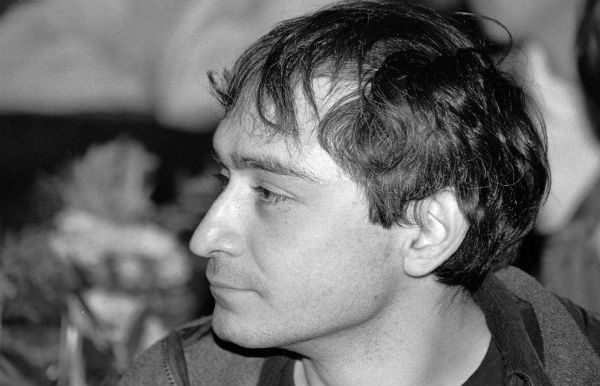Leonid Kaganov is a Russian science fiction writer, journalist and blogger, who goes by the well-known name Lleo in RuNet. He is the author of several books, songs, TV programs and films.
Russia didn’t sign the recent OSCE-proposed “Declaration of Fundamental Human Rights in the Digital Century,” the aim of which is to defend bloggers, users of social networks, editors of online media, and readers from censorship by the authorities. Do you, as a blogger, experience a restriction on freedom of speech or any other risk?
I, as a Russian blogger and journalist, can say that there isn’t strict censorship online here. In Russia, they’re quite afraid that there will be censorship, and they react very painfully at any attempt at censorship. But there’s no law that obliges [hosting] providers to report on things; there are no tools that will allow them to find out who wrote what.
Personally, I encountered censorship three years ago when they shut down my site that had been live since 1996. I reposted a poem which had appeared on the extremist censorship list. It was for this reason that I posted it; I was surprised that there was literature that was forbidden in our country. Two years after publishing that anti-Semitic poem, special services found it and asked the provider to remove it from the site. And the provider, to protect itself, instead of removing the poem, removed the entire site.
Lately, I’ve been writing quite drastic things; I’m in a very anti-governmental mood because I don’t like what’s happening in Russia right now. On the other hand, I don’t belong to the marginal or radical groups who shout that Putin and his gang should be sentenced and so on. Maybe I would’ve been on the side of the radicals [if I] had issues. But they’ve never called me; there’s been no problem; though at 10,000 visitors, my blog was in the top three most visited on [Russian search engine] Yandex.
What do you think, should comments be moderated, and based on what principle?
I’ve been moderating comments on my blog posts for a long time. I find that comments have to be moderated because like attracts like. When people see that there are insults or profanities in the comments, it becomes an impetus for other to write similar things. I moderate very strictly. For example, I’ve always moderated both political and product advertisements. I’ve likewise moderated comments which contain insults or profanities aimed at my friends or others who I respect. My blog is not a debate club — it’s my personal blog. Why should I allow dirt and curses against my friends?
I strive to have all points of view represented. If someone writes a normal, intelligent, meaningful comment, even if I’m against it, I leave it. If he writes one, two uneducated statements with insults, why should I allow it?
Furthermore, I close comments two to three days after I publish a post because they’re too many and they begin to repeat themselves. People, not reading the previous comments, repeat that which I responded to in the previous 30 comments.
But I have one principle: I read all comments, even if I don’t publish them on the site. So the reader can rest assured that I will definitely read her opinion.
In Armenia, an online news site was sued for comments left by readers below one of its articles. What’s the practice in your country?
In Russia, ridiculous and absurd court cases are many. A person who reposted someone else’s photo was sued. Such absurdity happens every day. For example, the LiveJournal Abuse Prevention Team blocked writer, publicist Aleksandr Nikonov because he had reposted another author’s poem on pedophilia published in some newspaper.
I must confess, generally the situation we have here is not that legal, and the question of freedom of speech is complex, but fortunately, there isn’t yet mass censorship in Russia.
What’s your opinion on anonymous blogging?
The question of anonymity is quite complicated. As Ivan Zassoursky said, “Anonymity is a big city phenomenon.” It’s one of the latest achievements of civilization. At one time, everyone knew everyone and there was no anonymity. In my opinion, along with the development of social networks and identification systems, anonymity will be a thing of the past. Perhaps not. It’s hard to say — is anonymity our future or a temporary phenomenon? At the same time, it’s understandable that the phenomenon of anonymity has both its good and bad sides. And it’s hard to understand which one to lean toward.
When a group of anonymous people come to my blog and, to put it descriptively, pollute and leave filth in the comments, realizing that they can go unpunished, of course, I fondly recall the days before the Internet when there was FidoNet where there was a clear hierarchy and numbering system. Everyone had his own number and a “boss” who was responsible for him. But there was no anonymity. There was a system of resolving disputes. And if anyone did anything that was unacceptable, punishment was removing them from FidoNet. Along with all this, no one complained that FidoNet was not a free network.
And now, realizing that he will go unpunished and no one will find him (impunity fills him with courage because for some people the brakes no longer work), in real life, at work, on public transportation, at the store, not being able to say all that you think about the people around you — the person pours out that accumulated negative [energy] online and says anything and everything.
On the other hand, for those people who have information but, fearing retaliation, avoid publishing it online, anonymity is the only way out. That’s why I, as a person who suffers to a certain extent from anonymity online, don’t think that eliminating anonymity for me will be a good thing generally. This is the two sides of the coin, one side of which is invisible, but turning it over will confront it with bigger problems.
Social networks have become more active in Armenia, while blogs are in relative peace — many move from blogs to social networks. What’s the trend in Russia?
For us too there’s a trend of moving from blogs to social networks. This is a worldwide trend and is due to an increase in internet users. Because not everyone is ready to “pull themselves together” and write — to put it descriptively, work on a piece. For example, I and my blogger friends to put together a good piece spend about 5 hours. It seems that it’s five images and a few lines, but all that has to be thought about, formulated and written.
Now there are people online whose profession is distant from journalism, writing and other professions. You can’t expect that a person coming home from the factory will write a large piece with the same expertise that a journalist with 10 years of work experience will. That’s why the trend is for content to be created with minimal effort.
All you need now to create an ‘information event’ [i.e. an activity] is one click of the mouse. That’s why social networks are growing at higher and the blogosphere at lower rates.
Interview conducted by Anna Barseghyan







